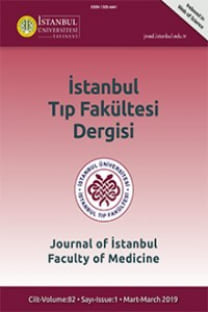POSTERİOR FOSSA CERRAHİSİ SONRASI ÇOCUKLARDA GÖRÜLEN SEREBELLAR MUTİZM: OLGU SUNUMU
Serebellar mutizm çocukluk çağında arka çukur tümörleri cerrahisinden sonra gelişebilen bir komplikasyon olarak oluşabileceği dökümante edilmiştir. Ayrıca vasküler ve dejeneratif hastalıklar da serebellar mutizm oluşumuna neden olabilmektedir. Bu durum genellikle 6 aylık bir zaman içerisinde düzelme göstermektedir. 11 yaşında erkek hasta baş ağrısı, bulantı ve kusma yakınması ile başvurdu. Posterior fossa da büyük (45x40x50mm) kitle tespit edildi. Ameliyat planlandı ve opere edildi. Postoperatif dönemde nörolojik defisiti yok idi. Postop üçüncü gün mutizm gelişti. Etyolojisi tam olarak bilinmemekle beraber, cerrahi sırasında serebellar nükleusların ve vermisin hasar görmesinin, vasküler spazm gelişmesinin bu kliniğin oluşumundan sorumlu olduğu düşünülmektedir. Bu olgumuzda çocuklarda posterior fossa tümörleri cerrahisi sonrası gelişen serebellar mutizm olgusu literatür ışığında incelenmiştir.
Anahtar Kelimeler:
kafa çukuru, arka, serebellar hastalıklar, mutizm
CEREBELLAR MUTISM FOLLOWING POSTERIOR FOSSA TUMOR RESECTION IN CHILDREN: CASE REPORT
Serebellar mutism has been documented as a complication that could occur and develop after posterior fossa tumor surgery during childhood. Cerebellar mutism also may be caused by vascular and degenerative diseases. Disruption of speech in cerebellar mutism is usually temporary but some permenant cases may ocur. Mutism usually disappears in six months period. An 11 year old male patient was ad mitted with headache, nausea and vomiting. A large mass (45x40x50mm) has been identified in posterior fossa. An operation has been planned and carried out. There was no any neurologic deficit during postoperative period. Mutism has developed on third day postop. During surgery, injury to cerebellar nucleus and vermis and vascular spasm have been suggested but the etiology is not clear. In this case, development of cerebellar mutism after the operation of posterior fossa tumor in children has been discussed in light of literature.
Keywords:
Cranial fossa, Posterior; Cerebellar diseases; Mutism,
___
- Catsman-Berrevoets CE, Van Dongen HR, Mulder PG, Paz Geuze D, Paquier PF, Lequin MH. Tumour type and size are high risk factors for the syndrome of "cerebellar" mutism and subsequent dysarthria. J Neurol Neurosurg Psychiatry. 1999; 67: 755-757.
- Crutchfield JS, Sawaya R, Meyers CA, Moore BD: postoperative mutism in neurosurgery. Report of two cases. J Neurosurg 1994; 81: 115-121.
- Dailey AT, McKhann GM II, Berger MS: The pathophysiology of oral pharyngeal apraxia and mutism following posterior fossa tumor resection in children. J Neurosurg 1995; 83: 467-475.
- Dietze DD Jr, Mickle JP. Cerebellar mutism after posterior fossa surgery. Pediatr Neurosurg. 1990-1991; 16: 25-31.
- Doxey D, Bruce D, Sklar F, Swift D, Shapiro K. Posterior fossa syndrome: identifiable risk factors and irreversible complications. Pediatr Neurosurg. 1999; 31: 131-136.
- Erşahin Y, Mutluer S, Çağli S, Duman Y: Cerebellar mutism :report of seven cases and review of the literature. Neurosurgery. 1996; 28: 60-66.
- Gok A, Alptekin M, Erkutlu İ: Surgical approach to the fourth ventricle cavity through the cerebellomedullary fissure. Neurosurg Rev 2004; 27: 50-54.
- Huber JF, Bradley K, Spiegler BJ, Dennis M: Long-term effects of transient cerebellar mutism after cerebellar astrocytoma or medulloblastoma resection in childhood. Childs Nerv Syst 2006; 22: 132-138.
- Kabataş S, Yıldız Ö, Yılmaz C, Altınörs MN: [Cerebellar mutism after posterior fossa surgery in children: Review of the literature] Türk Nöroşirürji Dergisi. 2008;18 3:155-161
- Kempe LG: Operative Neurosurgery. In: Kempe LG (Editor). Operative Neurosurgery, Cilt 2, Wien, New York: Springer, 1970: 14-17. 51
- İstanbul Tıp Fakültesi Dergisi Cilt / Volume: 75 • Sayı / Number: 3• Yıl/Year: 2012
- Başlangıç: 1916
- Yayıncı: İstanbul Üniversitesi Yayınevi
Sayıdaki Diğer Makaleler
Nilgül YALÇINOĞLU, İlker KAYI, Şahin IŞIK, Tekin AYDIN, Şehmuz ZENGİN, Selma KARABEY
DALIŞ SERTİFİKASYONU EĞİTİM PROGRAMINDA SCUBA DALICILARINDA GÖRÜLEN TEMPOROMANDİBULER BOZUKLUKLAR
Özmen ÖZTÜRK, Mustafa TEK, Hüseyin SEVEN
POSTERİOR FOSSA CERRAHİSİ SONRASI ÇOCUKLARDA GÖRÜLEN SEREBELLAR MUTİZM: OLGU SUNUMU
Ahmet ÖZDİLMAÇ, Halit ÇAVUŞOĞLU, Ahmet MÜSLÜMAN, Yunus AYDIN
